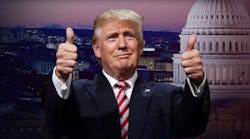President-elect Donald Trump has promised to make America’s infrastructure great again, but exactly how he’ll put his vision into action—and what those policies will mean to trucking—has not been settled. While highway users can be hopeful about his campaign pledge, based on his extensive construction experience, to “build the greatest infrastructure on the planet earth,” his recent policy outline leans heavily on user fees (and which some suggest means privatization, which means tolling).
Still, the American Trucking Assns. anticipates having a seat at the transition table.
“During the campaign, he highlighted the need to create jobs, and recognized that improving our nation's infrastructure is critical to strengthening the economy. … We look forward to working with President-elect Trump on a host of issues, including long-term, sustainable infrastructure funding, tax reform and fair and free trade,” said ATA President and CEO Chris Spear, in a statement. “We have already begun meeting with the Trump transition team, and look forward to working closely with the new Administration on issues that will allow the trucking industry to continue to grow and move America forward.”
Free trade, however, might be a tough sell. In addition to his famous pledge to build a wall at the border with Mexico, Trump campaigned on a promise to undo the North American Free Trade Agreement. Not only do trucks carry the majority of overland trade with Mexico and Canada, truck makers have assembly plants south of the border.
Morningstar analyst Keith Schoonmaker points out that railroads Kansas City Southern and Union Pacific would both be hurt by substantial changes to the trade agreement. “It’s pretty uncertain what the long-term renegotiation of NAFTA would look like, but even just the sentiment of ‘there’s a candidate who just won who thinks NAFTA is a bad idea,’—that certainly wouldn’t be a positive,” he said in a Bloomberg Markets report on the “aftershocks” of the Trump victory.
Also, the Trump administration could roll back some Obama-era regulations. A morning-after note to clients from the Stifel transportation equipment team suggest the second round of greenhouse gas limits for trucks could be such a target, given the long lead time to implementation.
As to Trump’s cabinet, the post of Transportation Secretary is conspicuously absent from the Politico’s post-election speculation. Broadly, the report suggests the transition team has a short list that features “industry titans and conservative activists who could comprise one of the more eclectic and controversial presidential cabinets in modern history.”
Of course, every president submits budgets and plans, then Congress does what it wants. Trump the candidate was often at odds with the Republican leadership in Congress, so the first infrastructure project of the Trump administration is likely to be the repair of the political bridge to Capitol Hill.
But Trump still should face less partisan resistance than President Obama, now that Republicans have held on to majorities in both the House and Senate. A key ally, after surviving challenges in the both the primary and general elections, will be Rep. Bill Shuster (R-Pa.), chairman of the House Transportation and Infrastructure Committee. But as recently as the Republican National Convention in July, Shuster told Business Insider that Trump had not provided him with any specific plan. Still, Shuster noted that Republicans historically have been the “infrastructure presidents.”
“Infrastructure is a Republican issue, but over the years we’ve lost,” Shuster said. “We’ve got to get back to figuring out how to build out and rebuild our national transportation. It’s essential to having a strong economy.”
Another trucking ally in Congress, Rep. Jeff Denham (R-CA) appears on the road to a narrow victory in his hotly contested contest. Denham has led the legislative effort to give interstate carriers relief from California’s minimum wage and rest break laws.
A range of state and local transportation and infrastructure measures were on ballots, as well. These included:
- a “lockbox” amendment in Illinois, which passed easily, to require all transportation taxes and fees be spent exclusively on transportation projects
- similarly, New Jersey voters approved a constitutional amendment dedicating gas tax proceeds to transportation projects
- gas tax proposals struggled in several locations in Oregon and Nevada
- a transportation sales tax in Venture County (CA) failed to meet the two-thirds majority it needed, while voters in Stanislaus Country approved the tax.
AASHTO has posted a more complete list of the transportation votes.



